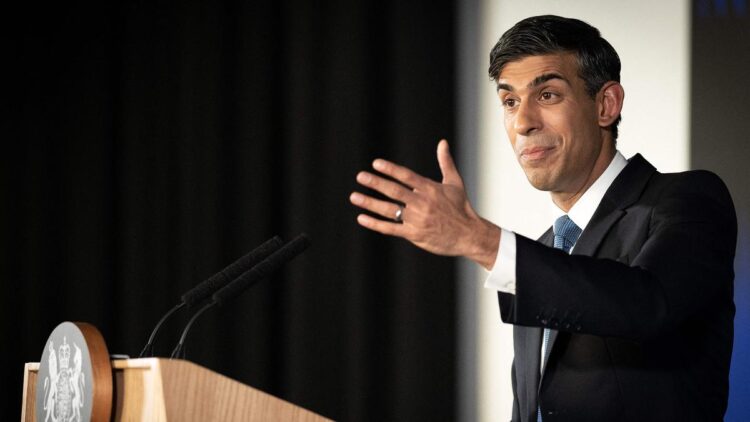
Britain’s Prime Minister Rishi Sunak delivers his first major domestic speech of 2023, at Plexal, Queen Elizabeth Olympic Park in east London, on January 4, 2023.
| Photo Credit: AFP
Facing a country beset with problems that range from a cost of living crisis to deteriorating public services, U.K. Prime Minister Rishi Sunak promised to halve inflation, grow the economy and reduce wait times for medical treatments in a speech that set out his policies for the year.
Mr. Sunak, who has been in office for just over ten weeks, also promised to reduce public debt, and crack down on illegal migration across the English Channel in a speech to an audience in London on Wednesday afternoon.
“So, five promises – we will: Halve inflation, grow the economy, reduce debt, cut waiting lists, and stop the boats,” Mr. Sunak said, adding, “And we will have either achieved them or not.”
Also Read | The job and the man: On Rishi Sunak
The Prime Minister also used his speech to indicate general policy directions for the country, including a new education policy that would make some form of mathematics compulsory up to the age of 18. He spoke about the value of family as being central to the policy direction of the current government.
Hours before Mr. Sunak’s speech, the British Retail Consortium announced that food inflation in December had hit a record high of 13.3%. While overall inflation has shown signs of declining, the cost of living crisis has already impacted Britons significantly, including workers in the public sector.
Also Read | Explained | What triggered the U.K.’s economic crisis?
Staff, such as ambulance drivers and nurses, at Britain’s National Health Services (NHS) went on strike in December, demanding better pay and working conditions. This combined with health care staff shortages, a lack of sufficient hospital beds and surging influenza and COVID-19 winter infections has meant painfully long – and sometimes fatal – waiting periods to get treatment.
The BBC reported that a ninety-year-old woman, who had suffered a broken hip from a fall the day after Christmas, had to wait 23 hours for an ambulance and a further four hours inside the ambulance, as she awaited treatment.
Transport and government workers (such as the border force) went on strike in December, with unions announcing further strike days for January.
Mr. Sunak said he valued the work of unions and they had a right to strike but this had to be balanced with the right of the public to “go about their lives.”
Asked why he should be trusted, when the country’s burgeoning problems had been preceded by 13 years of Conservative government, Mr. Sunak pointed to his record during the COVID-19 crisis (when, as Chancellor, he had deployed a scheme that helped companies keep employees on their payroll).
With a general election looming in two years or less, Mr. Sunak, in his speech, repeatedly said he should be “held to account” for achieving his targets. However, he did not specify targets or time frames for all his five promises, acknowledging that some priorities may take more than one parliamentary term and others were not entirely in his control.
















